Living a Life Beyond the Norm–Lessons Learned from the Levitical Priesthood
Living a Life Beyond the Norm--Lessons Learned from the Levitical Priesthood
Organizations establish standards by which its members’ job performances are judged. There are set standards and job performance levels that separate an average from an exceptional worker. A member’s job performance when compared to those standards may determine that member’s standing in the organization; advancement opportunities in that organization; and even the amount that member will be paid. Those members who find themselves rated as exceptional employees tend to be rewarded with higher responsibilities, privileges and salaries within the organization. Unlike any other human organization or activity, YHVH established the standards by which our performance will ultimately be judged by our Master, Yahoshua Messiah. Our positions and privileges in the Kingdom of YHVH will depend upon how we measure up to those basic, and most importantly, exceptional expectations. In this post, we focus on the exceptional life to be lived by disciples of Yahoshua, using the expectations that were modeled for us by our Master Yeshua and the expectations that were established for members of the Levitical Priesthood in Leviticus 21: 1-22:16. In so doing, the true disciple of Yahoshua HaMashiyach is expected to live a life beyond the norm.
YHVH’s Expectations Established
YHVH provided us the standards by which we are expected to live. Those expectations are encapsulated in His eternal Torah and through the teachings and example of Yahoshua Messiah. As with any human organization, there are basic standards and expectations, as well as exceptional standards and expectations. The basic standards YHVH established for day-to-day living are embedded in Torah–the first-five books of the Old Testament. The exceptional standards and expectations established by YHVH were delivered to and modeled for us by His Son, Yahoshua our Messiah. I believe we also see exceptional expectations and standards that were given by YHVH to the Levitical Priesthood. Those exceptional standards and expectations offer us, in a sense, a shadow picture of the exceptionally high standards that Yeshua requires of all of His disciples.
Levitical Priesthood Standards/Expectations Were Higher Than the Norm
One-fifth of Torah is dedicated to the rigorous, exceptional standards and expectations that YHVH established for the Levitical Priesthood. At the time these instructions were handed down to us, very little of those priestly expectations and requirements applied to the average Israelite. Those standards were established specifically for the Levitical Priesthood. The Levitical Priests were expected to meet, not just the basic, core, rote-mechanical standards and expectations of Torah that applied to every Israeli male. They were expected and required, in addition, to meet exacting, ritual-holiness-cleanliness standards that exceeded the universal standard, basic instructions of Torah. Failure to meet both the standard and exceptional standards and expectations disqualified a Levite from serving in the sanctuary and serving the nation.
Higher Standards and Expectations For Every Disciple of Yeshua
I contend that we who are Torah Observant Believers in Yahoshua Messiah are now, and in the future, expected to not only meet all applicable Torah instructions (i.e., commandments), but also every applicable aspect of Torah that is over and above each rote-mechanical aspect of Torah (e.g., not only are we to not commit adultery or fornication, but we are not to look upon another member of the opposite sex who is not our spouse in a lustful manner).
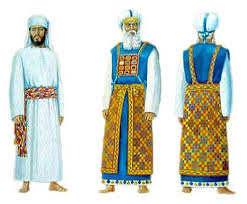
The expectations and standards set for a Levitical Priest was beyond the basic standards for men by Torah.
It is about living a life that is above and beyond the NORM. This is about living and exceptionally righteous life. I would submit to you that failure to meet both the basic and those exacting, exceptional standards and expectations will adversely affect our role and inclusion in the Kingdom of YHVH.
Torah Is NOT Just a Jewish Thing
Many outside of our Faith Community adamantly contend that Torah was created and implemented for the Jews. These maintain that the Jews failed to keep Torah and thus forfeited their opportunity for salvation and that Christians have replaced the Jews in God’s great plan of salvation for mankind. Is this an true line of thought and teaching? Well, when Torah was given to us during our sojourn in the Sinai Desert, and even after we entered the Land of Promise, the bible clearly indicates that all 12-tribes of Israel were subject to Torah. By the first half-of the 6th-century B.C., 10 of our 12-tribes had become scattered by the Assyrians leaving only the tribes of Judah and Levi. Today, the identities and locations of those scattered 10-tribes of Israel are lost to the memory of world history. Interestingly, during the time our Master, Yahoshua and His handpicked disciples walked, taught and preached on this earth, the identities and locations of those 10-tribes was well known to the Jews of the Ancient Near East (Matthew 10:6; 15:24; 9:36; Jeremiah 50:6). Scholars who have attempted to identify some of the lost “Sheep of Israel;” or rather the misnomer “Lost 10-Tribes of Israel,” have found archaeological evidence that is scattered throughout the eastern and western world that many of the scattered peoples have kept Torah to a lesser or fuller extent throughout the ages.
The Pharisaical religious establishment has successfully duped the world into thinking that Torah (and the Land of Promise) was given only to the Jewish nation. Christianity then took this Jewish-only mindset and understanding a few steps further by hijacking and corrupting the concept and doctrines of “grace.” Christianity teaches the “Law” was for those evil Jews who will suffer for their refusal to play by God’s rules, but we Christians are under grace and not required to keep one jot or tittle of the “Law.” By default, the Christian worldview has separated would-be disciples in Yeshua Messiah (thought of mainly as Gentiles) from their naturalized Israeli heritage and Faith that is based upon Torah. Therefore, the hijacked doctrine of grace has unceremoniously completely eliminated Torah as a life-expectation and requirement for any would-be disciple of Jesus Christ (i.e., Yeshua Messiah). This doctrine is not only false, it is also the vehicle by which countless well-intended, sincere, but grossly misinformed souls will NOT be admitted to the Kingdom of YHVH in the World Tomorrow.
None of this is to say, in the least, that a would-be disciple of Jesus Christ (i.e., Yeshua Messiah) receives admittance to the Kingdom of YHVH or eternal life by keeping Torah. To the contrary, eternal life and admittance into the Kingdom is a gift of YHVH that was won and will be delivered as a result of the atoning sacrifice of Yahoshua on the execution stake on that fateful Passover Day on or around 28 C.E. Nevertheless, for the true Disciple of Yeshua HaMashiyach, Torah stands as YHVH’s house rules that every disciple is expected to honor, keep and obey as applicable under the Renewed Covenant.
Torah Expectations and Requirements For Levitical Priests Were Over and Above The Basic Torah Instructions
Abba passed on to Moses (i.e., Moshe) and Aaron (i.e., Aharon) and Aaron’s posterity, the exceptional standards and expectations that would be required in order for the males in Aaron’s lineage to serve the nation of Israel. As we can see throughout the book (i.e., the Cepher) of Leviticus, these standards and expectations were often rigid and were overall, over and above the baseline instructions given for every Israeli male. It was these exceptional expectations and standards set the would-be Levitical Priest apart from the rest of the nation in the manner of:
- His conduct
- His behavior.
- His home life
- His diet
- His finances
- His cleanliness (both physically and ritually speaking)
- His service in the Sanctuary
- His service in the community
- His attire (i.e., his clothing)
- His reputation.
Things to Keep in Mind When Studying Leviticus
When reading through and studying Leviticus and the Levitical Priesthood, it is important to keep the following in mind:
- the Levitical Priesthood has passed away.
- As Torah Observant Believers in Yeshua Messiah, we are no longer under the Levitical Priesthood, but under the Melchizedekian Priesthood whose High Priest (i.e., Cohen Gadol) is our Master Yahoshua Messiah.
- “YHVH has sworn and will not change His mind, ‘You are a priest forever according to the order of Melchizedek'”(Psalm 110:4; cf. Hebrews 5:6; 6:20; 7:15-17).
- As a Torah Observant Believer in Yeshua Messiah, each of us is fully naturalized Israelite possessing all of the privileges and benefits afforded any true, Torah-keeping, naturally-born Israeli Disciple of Yeshua.
- As Torah Observant Believers in Yeshua Messiah, we have been commissioned to be a nation of priests unto YHVH (Revelation 1:6; 5:10; 20:6).
- Like the Levitical Priests of old, as Torah Observant Believers of Yahoshua Messiah, there are rigid, exacting standards and requirements that we are expected to meet and maintain. Those standards and expectations were enumerated, taught and modeled for us by our Master Yeshua.
- As Torah Observant Believers in Yeshua Messiah, we will be judged accordingly by Yahoshua based upon those standards and expectations.
- What good is studying this or any other similar portion of Torah addressing the Levitical Priests?
- Torah provides us an example (although a crude one) of heavenly things and of prophetic shadow pictures of good things to come. (cf. Hebrews 8:5; 10:1)
- We are NOT obliged to keep the instructions directed to the Levitical Priesthood (e.g., wearing priestly clothes; purification rituals; serving in a make-shift sanctuary; etc.).
- Since we are to serve as Priests of YHVH, under the leadership of Yeshua HaMashiyach, these instructions serve as a wonderful reminder of the high standards and expectations a would-be Priest of the Most High Elohim is required to meet and live out.
- Master established similarly established high standards and expectations for us, His Disciples. These standards rival the most exacting requirements of the Levitical Priesthood. THEY ARE NOT EASY.
- These standards and expectations are, in effect, the fullness of Torah, that we are expected to measure up to in our day-to-day lives and in our work for the Kingdom of YHVH. Unfortunately, most of the world will not meet those high standards and expectations. Case in point is the story of the Rich Young Man (Pharisee, found in Matthew 19:13-20:16; Mark 10:13-31; Luke 18:15-30. Here we see a level of commitment and responsibility established by Father and implemented by our Master that disqualifies most from entering the Kingdom and service of YHVH.
We Are A Nation of Priests
Yahoshua has made us to be a kingdom of priests to His Elohim and Father (Revelation 1:6; 5:10). As priests of the Most High, the examples given in Torah relating to the required ritual cleanliness of every Levitical Priests 24-hours a day, 7-days a week, should serve as a reminder to us of our Master’s expectations for us. When these expectations and requirements are understood through the doctrines and teachings of Yeshua our Messiah, we should come to realize how important our personal and spiritual cleanliness is to YHVH. Father requires that we be “holy as He is holy” (I Peter 1:15, 16). That requirement has not changed in the least, despite the Torah naysayers that teach a perverted grace doctrine that inputs upon a Christian believer perpetual cleanliness and holiness. What this perversion is actually saying to the world is that all you need to do to inherit eternal life and have a relationship with the Creator of the Universe is ask Jesus Christ into your heart. Upon asking Jesus Christ into one’s heart, then grace takes over and your eternal life ticket is punched. You can live anyway you choose to live because God’s grace inputs perpetual righteousness to us and we become “holy” by default, forever.
This perverted version of grace is so far from Truth that it’s not even funny. We are required to “be” holy–to live holy lives; to live a life that is beyond the norm of all humanity, or even Christianity for that matter. The Apostle Peter wrote:
Gird up the loins of your mind (Greek for mind is Anazunomi, which means to prepare one’s mind for action); be sober; and hope to the end for for the grace that is to be brought unto you at the revelation of Yeshua Messiah. As obedient children, not fashioning yourselves according to the former lusts in your ignorance, but as He which hath called you is holy, so be ye holy in all manner of conversation; because it is written: “Be ye holy; for I am holy” (I Peter 1:13-16; cf. Leviticus 20:7; KJV).
Thus, we are not to defile ourselves or become spiritually and physically tainted by the things of this world, which when given over to, serves to blunt our service and effectiveness as priests of YHVH. By default, then, we are to die to self (reference Romans 6:2, 11; 2 Timothy 2:11).
Like the Levitical Priests of old, the standards by which we are to live are higher than most people will ever aspire or conceive to meet. Those lofty, but doable standards and expectations, affect how we conduct every aspect of our lives:
- Our family, work, community and other personal relationships
- Our diets
- Our behavior and habits
- Our individual thoughts and feelings
- Our participation in modern life activities
- Our obedience to YHVH’s instructions (i.e., His Torah).
An entire book (i.e., cepher) of Torah was dedicated to instructions for the Levitical Priesthood. The requirement for exacting ritual purity and cleanliness in order for any priest to serve the nation in the community and in the sanctuary cannot be understated. YHVH requires, without exception, cleanliness and purity in order for any to worship and commune with Him. The priestly ritual instructions were primarily in place to allow the priests to serve in the sanctuary and in worship of YHVH. The sanctuary was the place where YHVH’s presence rested. Thus, in order to approach the sanctuary (as a non-priest) and the inner sanctum (as a priest), one had to be in a state of ritual cleanliness.
Although the sanctuary no longer exists, Father still requires that each of us be in a state of cleanliness and purity when we come before Him in worship, prayer and service. We have a baseline cleanliness afforded to us by the shed blood of Yahoshua HaMashiyach. There are, however, ongoing things in our lives that cause us to be impure and unclean that we must constantly be cognitive of and constantly address. Such impurity and filth hinders our worship, walk and witness and service to YHVH and His Kingdom. Intentional and perpetual and unresolved uncleanness (i.e., sin, unholy behavior and habits, improper thoughts and feelings and a lawless life) will adversely impact and hinder, (1) our personal relationship with the Most High Elohim; (2) our service to the Kingdom of YHVH and our Faith Community; and (3) our present and future standing in the Kingdom of YHVH. Yeshua revealed:
“For I say to you that unless your righteousness surpasses that of the scribes and pharisees, you will not enter the Kingdom of Heaven (Matthew 5:20; NASB).
Many will say to me in that day, :Master, Master, have we not prophesied in they Name? And in thy Name, have cast out devils? And in thy Name done many wonderful works?” And then will I profess unto them, “I never knew you: depart from me, ye that work iniquity” (Matthew 7:22, 23).
Yeshua Set the Bar High
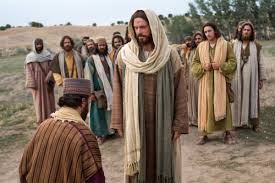
The story of the rich man and Yeshua is an excellent example of the high expectations set for disciples of Yeshua.
Master set the bar high for true discipleship. The sad, sorry and tired adage that so many so-called people of faith like to say, that God knows their heart, just doesn’t fly when one truly considers Master’s true discipleship standards and expectations. For it will be upon that great, end time revealing of the Sons of the Most High, that Yahoshua will separate those who are righteous from those who are unrighteous, and unfortunately for many, there will be no excuse accepted.
Master prophesied:
When the Son of Man shall come in His glory and all the holy angels with Him, then shall He sit upon the throne of His glory. And before Him shall be gathered all nations. And He shall separate them one from another, as a shepherd divideth His sheep from the goats. And He shall set the sheep on His right hand, but the goats on the left. Then shall the King say unto them on His right hand, “Come ye blessed of my Father, inherit the Kingdom prepared for you from the foundation of the world…Then shall say also unto them on the left hand, depart from me, ye cursed into everlasting fire, prepared for the devil and his angels” (Matthew 25:31-41).
Our Master set the bar high for true discipleship and service, just as Father set the bar high for Levitical Priesthood service. Are we then to follow the example of the Levitical Priests, per se? Well, no. The fact of the matter is that we follow exclusively the example of Yeshua HaMashiyach, our Master. The exceptional standards of the Levitical Priests are excellent shadow pictures of the standards and expectations that Master requires of us who are His disciples; we who are being made into a Kingdom of priests unto YHVH; conforming to the image of Yahoshua Messiah.
Faithfully,
Shalom and warmest blessings to you, your family and fellowship.
The False Hope of Imitation Christianity
If you've been called and chosen, this message is for you. But it's not for everybody. Questions: What does John 8:32?--You shall know the Truth and the Truth shall set you free. We are to get our information from Scripture. Do you know what you worship? What's the...
Overcoming Obstacles to Faith-Part 3-Learning From Ancient Israel’s Mistakes of Not Finding Contentment
Picking-up From Part 2 of the Series My goal in this message is to pick-up where I left off from my previous two messages on overcoming obstacles to belief. Quick Review of Parts 1 and 2 In Part 1 of this series, we looked at overcoming...
Overcoming Obstacles to Belief Part 2-Learning From Ancient Israel’s Mistakes of Murmuring/Complaining
Goal: Last week I presented to you an overview of the important differences that exists between believing IN YHVH verses believing YHVH and how life can and does create obstacles to our believing Yah. Also recall that I discussed two behaviors that proved to...
Overcoming Obstacles to Belief–Part 1: Learning From Ancient Israel’s Mistakes
Goal: What I intend to address in my message today is something that I believe is crucial for our (1) making it into the Kingdom of Yah; (2) successfully walking out our Faith in Spirit and in Truth; and (3) living the life abundant that Yeshua our Master...
Should Messianic Torah Observers Keep Thanksgiving? The Re-Broadcast
Should Messianic Torah Observers Keep Thanksgiving? In this installment, we reflect upon Torah-Keeping Believers in Yeshua celebrating Thanksgiving: Is it a terrible reminder of genocide that New World Settlers brought upon Native American Indigenous Peoples, or a day...
Lashon Hara-The Sin You Never Knew You Were Committing-Torah Reading Numbers 12:1-15
Verse-by-Verse Discussion Miriam and Aharon Engage in Subversive Conversation Verse 1—Two of Moshe's family members, Miriam and Aharon, engaged in some subversive conversation against Moshe. Moshe apparently married an Ethiopian woman which seemed to outrage the...
Finding Contentment in our Faith–Torah Reading-Numbers 11:1-35
Finding Contentment in our Faith--Torah Reading--Numbers 11:1-35 Verse 1--The peoples' complaining or murmuring (complaining about their hardships openly in Taberah or The Place of Burning) displeased Yah which led to His wrath coming down upon the people...
What Did Paul Mean by Being Under the Law–Part 1
Goal of this Post “For Yah shows no partiality (that is, Yah shows no favoritism). For all who have sinned without the law will also perish without the law, and all who have sinned under the law will be judged by the law. For it is not the hearers of the law who are...
Paul and the LGBTQ Community–A Messianic Perspective
The Indictment Against Homosexuality In our ongoing quest to untangle and clarify some of the more difficult and challenging Pauline writings, (of late making our way through the Book of Romans), I want to next tackle Romans 1:26-27. Now, most of us should be...
Feast of Tabernacles and the Kingdom of God in You
The Feast of Tabernacles and the Kingdom of God (of Yah) in You My goal in delivering this discussion to you here today is to communicate to you another way of looking at and understanding the Kingdom of Yah. Another perspective. Another angle. Another Truth....
Yom Kippur (Day of Atonement)–A Messianic Torah Observer Perspective
Introducing Yom HaKippurim (aka, Yom Kippur or the Day of Atonement) Instead of trying to figure out what the Day of Atonement/Yom Kippur/Yom HaKippurim is about through hearsay, public discourse or opinion, what do you say we delve into the riches of Torah to get...
Yom Teruah’s Greatest Truths and Mysteries (Revealed)
Yom Teruah's Greatest Truths and Mysteries (Revealed) Today I want to expand our understanding of Yom Teruah (aka The Day of the Blowing of Trumpets or simply the Day of Trumpets) from the day being just another one of the 7-annual Feasts of YHVH; just that...
Polygamy and the Bible–A Messianic Perspective
My Interest Piqued In my studies of this past week’s Torah Reading, I was drawn to Deuteronomy 21:15-17. Many modern English bibles generally entitle this passage something akin to “The Right of the Firstborn.” That being said, this short passage really is about the...
Picking Up and Moving Forward With TMTO
Update on TMTO (Special post without any fanfare and promotion)--Where we are today and where we'll be going. Discontinuing Live-Stream and Why. The failure of the Livestream. Non-committal group of individuals. Newsletter failures. Loss of focus on the original...
Torah Reading 48–Shofetim–Judges–Reading Outline
This week's Torah Reading is contained within Deuteronomy 16:1--21:9 and is entitled Shofetim. In English, Shofetim means Judges. If one were summarize the content of this reading I guess it could be described as a discussion of Yah's established civil...
The Righteousness of God Revealed From Faith to Faith—Its True Meaning and Reality for God’s People
Today’s discussion is entitled, “The Righteousness of God Revealed From Faith to Faith—Its True Meaning and Reality for God’s People.” Why The Church Loves This Romans 1:17 Fundamentalists; traditionalists; and evangelicals absolutely love this passage. Why? Because...
Jews Before Gentiles?
Today’s discussion is entitled, “Jews Before Gentiles? How Does that Work?” And the biblical basis for our discussion this evening is found in Romans 1:16 which reads: 16 For I am not ashamed of the gospel of Christ: for it is the power of God unto salvation...
Torah Reading 46–Ekev (Because)–A Focus on the Kingdom of God
Highlights and Comments Shalom Saints. This week's Torah Reading is entitled, "Ekev," or "Because." The portion covers Deuteronomy 7:12-11:25. I wish to share with you some of my thoughts and reflections on the many life truths that I drew from my study of this...
To Whom Do You Pray?
Who do you pray to and worship and give thanks? Yeshua? YHVH? Both? Is it Biblical to pray to and worship Yeshua as so many Christians routinely do? In this installment of the Messianic Torah Observer, we will continue our review of the Book of Romans and Paul's...
Messianic Sainthood–Paul and the Book of Romans
Paul Calls His Roman Readers Saints. What Gives? Our next challenging Pauline passage of the Book of Romans is found in chapter 1 verse 7 and it reads as such: "To all those in Rome who are loved by G-d and called to be saints: Grace to you and peace from G-d our...
Chevra Kadisha-Honoring the Jewish Dead
An Intriguing Article I recently became intrigued by an article I came across on the "My Jewish Learning" website. The article was entitled: "Chevra Kadisha or Jewish Burial Society." It was written by a Rabbi Joseph Telushkin. And yes: I do from time to time visit...
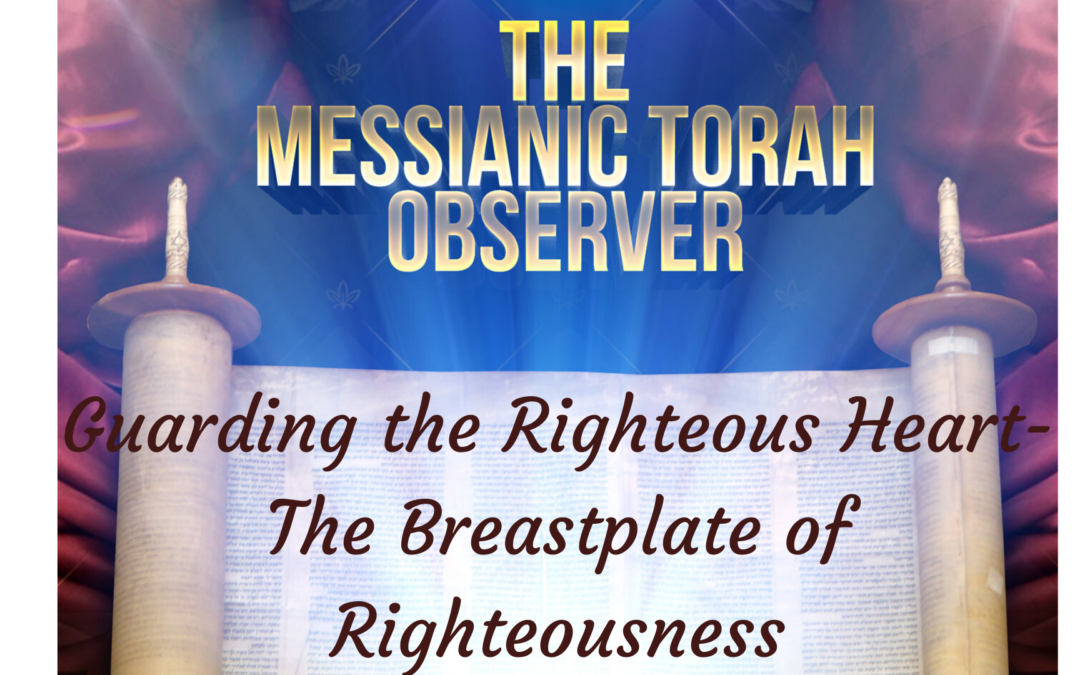
Guarding the Righteous Heart–The Breastplate of Righteousness–Paul and Hebrew Roots Series
How does the Child of Yah put on and use the Breastplate of Righteousness? Yeshua taught us how and we discuss in detail how to don and use this vital piece of spiritual armor: The Breastplate of Righteousness.
Putting on God’s Image-The Belt of Truth-Part 1 of the Armor of God Series
Ephesians 6:11-18—The Armor of Yah Famous passage of Scripture that most evangelical and fundamental Christians know and understand from a denominational standpoint. In fact, whole ministries have been launched and based upon this passage alone. And the focus seems...
Living the Life of a Priest of God–Yeshua-focused Torah Discussion–Torah Reading 91
Living the Life of a Priest of God (of Yah)--Torah Reading 91 Leviticus 21 Ezekiel 44:25-31 Luke 11:30-44 ________________________________________________________ Leviticus 21--Section Verse Study--Laws Concerning the Levitical Priests Know that you are special in...
Is Torah-Keeping Necessary For Salvation?
This week’s Torah Reading is about the Holiness Codes that Father provided to the Hebrews in order that they be set-apart from the nations of the world. These holiness codes remain in effect for every disciple of Yeshua and are of salvific expediency.
Obedience Versus Faith–Paul and the Book of Romans Series
Link to My Post Entitled: Messianic Duty During Times of Global Crises. This is Obedience Versus Faith--Part 18 of Our Paul and Hebrew Roots Series In preparing to discuss our next challenging Romans’ passage—1:16—I happened upon 1:5: an equally challenging passage...
Torah’s Forbidden Sexual Relationships-Yeshua-Focused Torah Studies–Torah Reading 89–Leviticus 18
This is Torah's Forbidden Sexual Relationships--Yeshua-Focused Torah Studies-Torah Reading -89--Leviticus 18 The underlying theme of our Torah Reading this Shabbat is Sanctification: Being Sanctified unto YHVH. Sanctification is that internal, spiritual...
Animal-Blood-Sacrifices–Torah Reading 88–Leviticus 17:1-16
Animal-Blood-Sacrifices Leviticus 17:1-16 Unpack this Torah Reading Verses 3-4 Prohibition against the slaughter of domesticated animals outside the Tabernacle System. The English term "kill" in Hebrew is SHACHAT {Shaw-Khat} which is rendered slaughter in...
The Book of Romans and the Gospel of God-Part 17 of the Paul and Hebrew Roots Series
Goal: This is “The Book of Romans and the Gospel of God—Part 17 of our Paul and Hebrew Roots Series.” Today we will begin our extensive study of the many challenging Book to the Romans passages by examining one of Shaul/Paul’s foundational doctrines....
The Day of Atonement-Yom Kippur-Torah Reading for 6-6-2020
Parashah 87--Leviticus 16:1-34--Day of Atonement-Yom Kippur-Torah Reading for 6-6-2020 Father Affirms and Enforces His Holiness (vss. 1 & 2) The transgression of Nadab and Abihu (Leviticus 10) led to Abba re-affirming that the Holy of Holies was not a place...
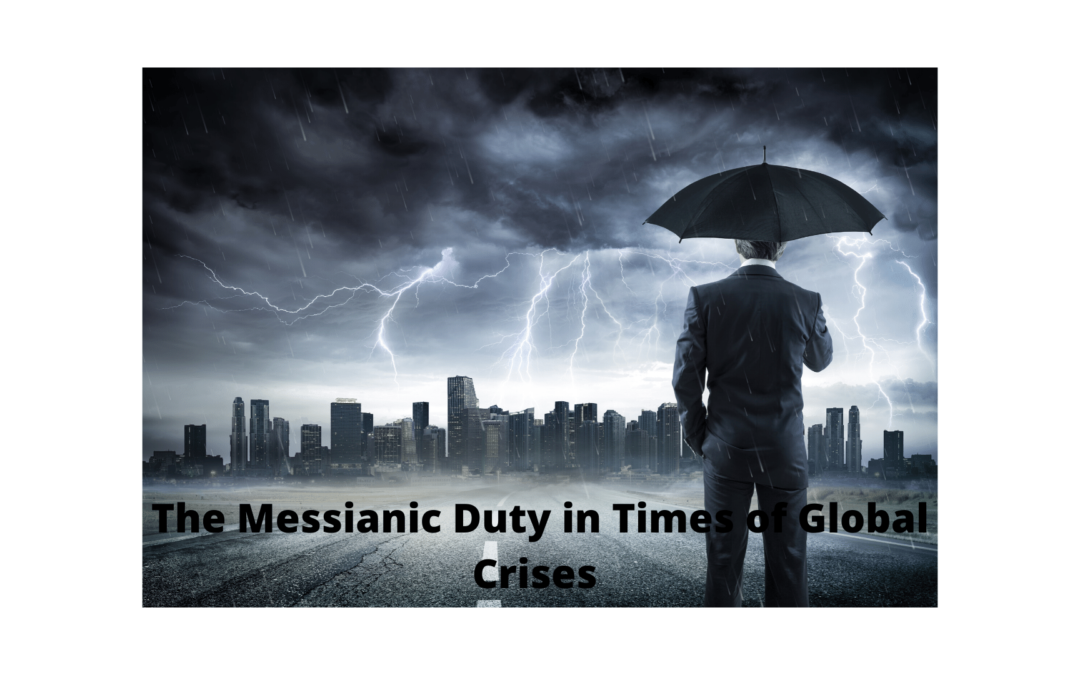
The Messianic Duty in Times of Global Crises
Given all the chaos and turmoil that is ongoing in the world today, I was led to talk to you today about duty. Specifically the Messianic duty in the midst of global chaos. Are we as Messianics required to put our two-cents towards fixing the clobal crises that are...
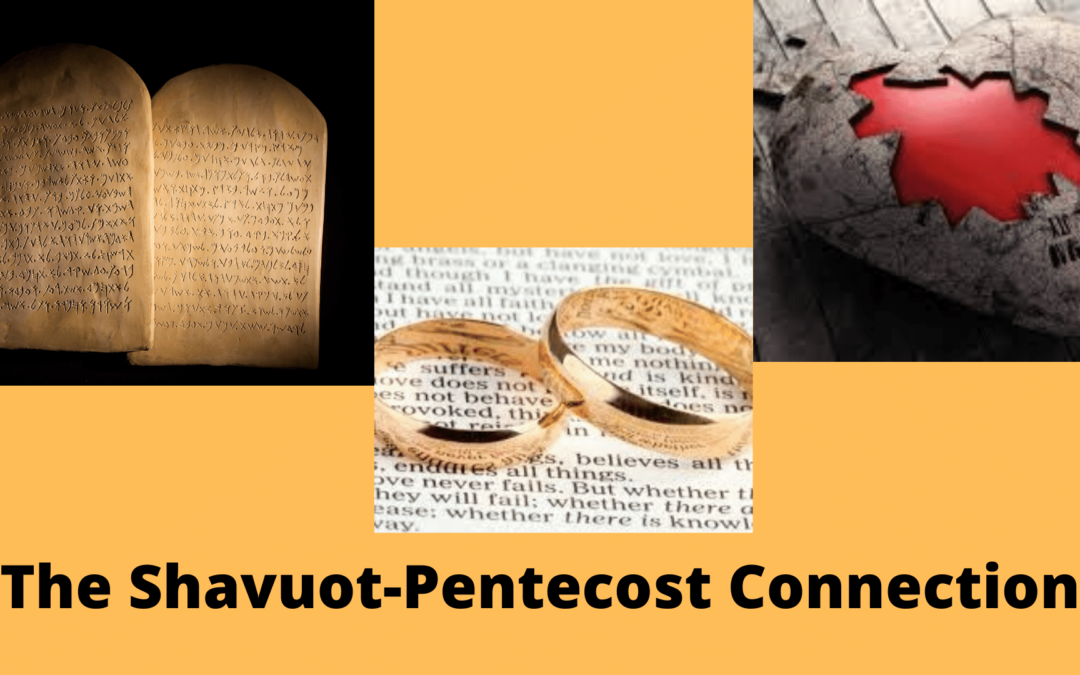
The Shavuot-Pentecost Connection
Two-Competing Schools of Thought Regarding Shavuot and Pentecost When we talk about Shavuot and or Pentecost there are essentially two-prevailing schools of thought and understanding. Interestingly, these two schools or lines of thought are often at odds with one...
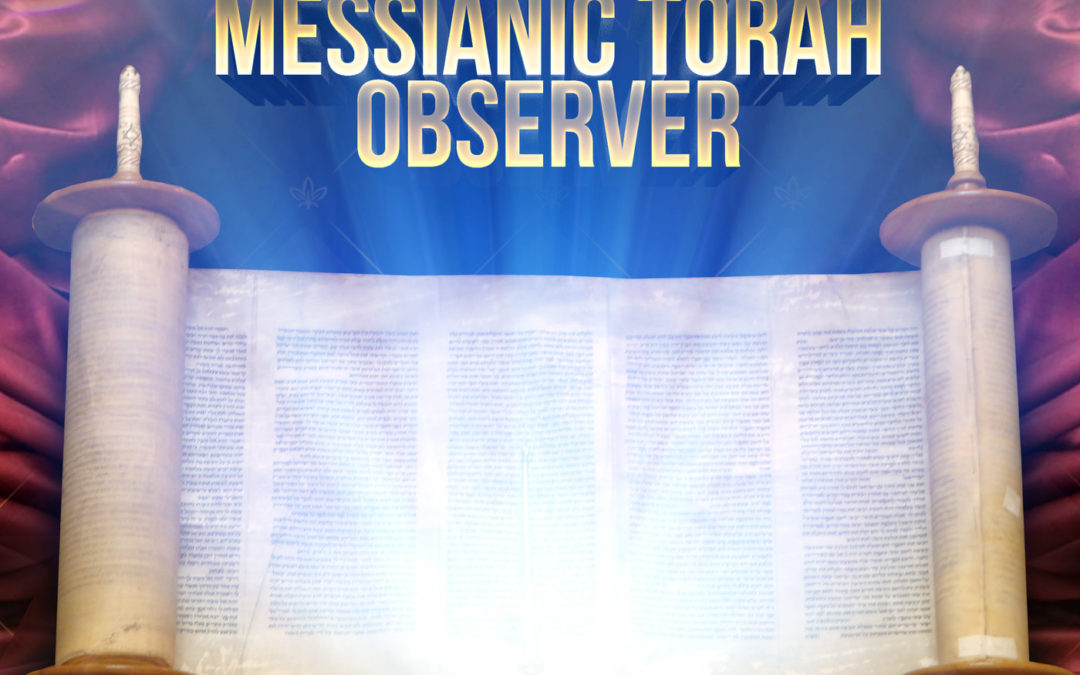
Shavuot 2020-When is It? How Did We Arrive at the Date? Do We Still Keep It ?
Explanation for this post As I record and post this installment of TMTO we are on the 4th day of the 3rd Month of the Creator's Calendar Year according to the observational calendar and the 5th day of the Month Sivan according to the Hillel's calculated...
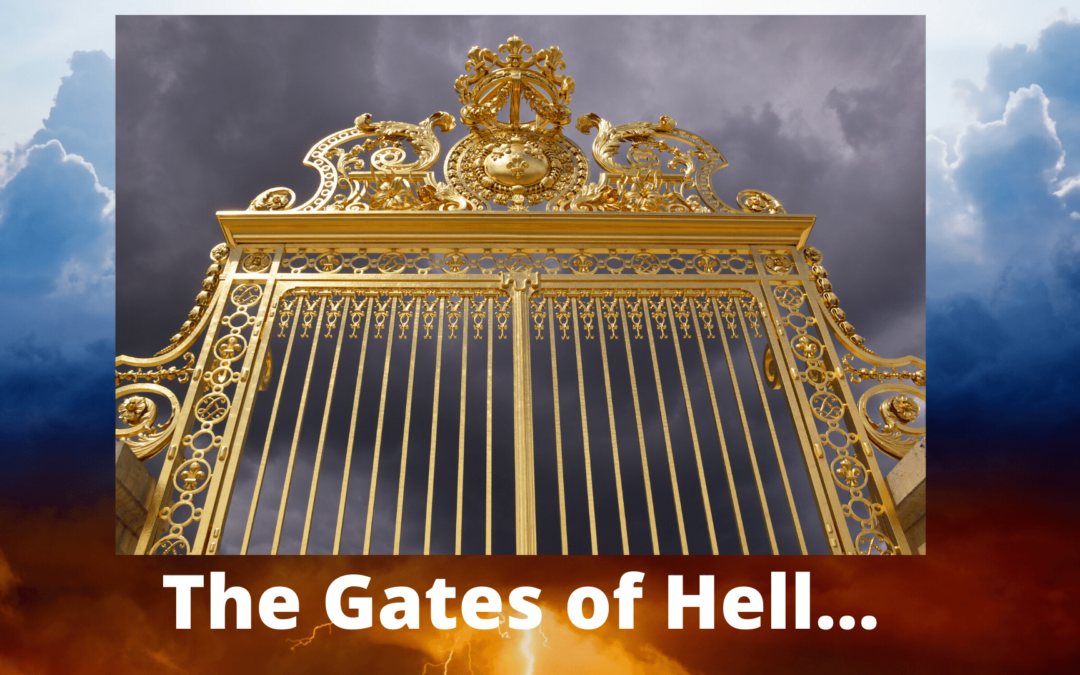
The Gates of Hell
The Gates of Hell Today I want to discuss the enemy’s goal to destroy and hinder the Creator's Plan of Redemption, Restoration and Salvation. It will become the purpose of this discussion to examine how the enemy was defeated by Master Yahoshua (Yeshua) Messiah and to...
The Book of Romans-To Whom Was It Written?
Our Purpose for This Post To whom was the Book of Romans Written? We know quite a bit about the author. But we may not know much about the so-called Romans or the Roman Church. Unfortunately, our understanding of who they are may be influenced by our...
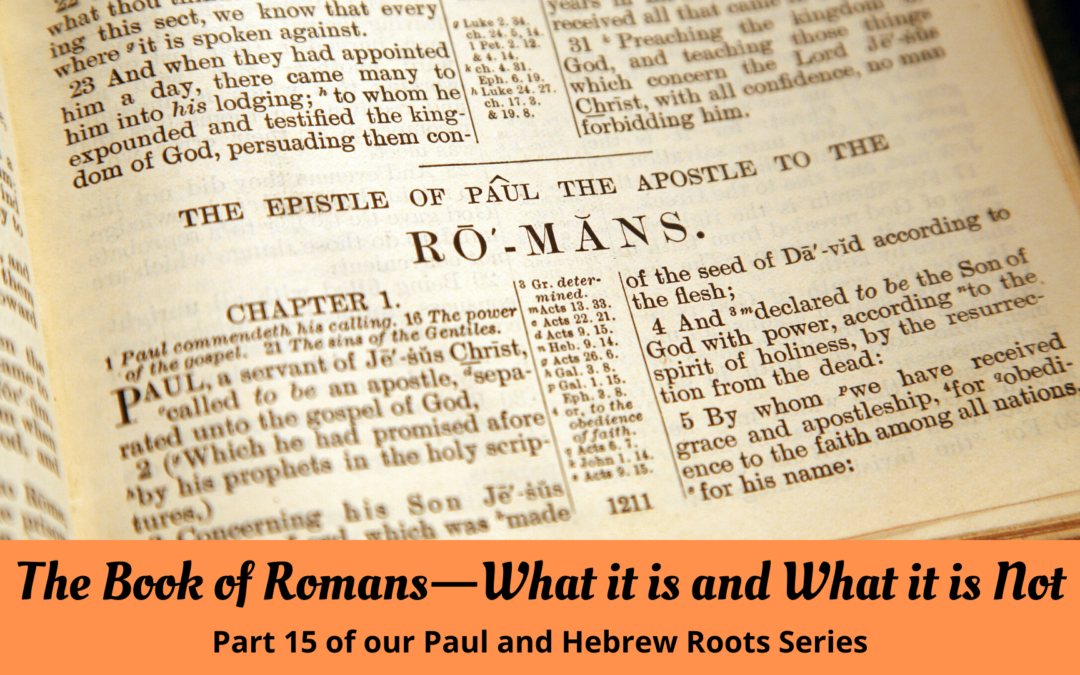
The Book of Romans-What it is and What it is Not–Part 15 of the Paul and Hebrew Roots Series
In this installment we resume our Paul and Hebrew Roots Series with a brief introduction to the Book of Romans. We discuss what the Book of Romans is, and what it is not.
The Niddah Laws–Still in Effect Today ?
The Question of Niddah One question that seems to pop-up a lot from members of our Faith Community has to do with the Laws related to Niddah. Are the laws of Niddah still valid for today’s Torah Observant Disciples of Yeshua Messiah? And in case you aren’t familiar...

Mark of the Beast: What Are You Going To Do When They Come For You?
The world’s power-brokers are suggesting implementing a tracking mark to distinguish those immune to the current virus from those not. Mark of the Beast? What will you do when they come for you?
The Feast of Unleavened Bread: A Ridiculously Long Week
My Struggle With Time One of the many things I struggle with in this life is the issue of time.Time is an enemy. It is often stressful. There never seems to be enough of it to go around. Time moves by so swiftly. And I often find myself fearful of wasting it; losing...
Our First Passover–An Overview of the First Passover Exodus Chapters 1 through 12
Exodus 1 70 blood relative of Jacob enter Egypt-->Joseph dies as well as the Patriarchs. Israelites grow in number. A pharaoh who did not know Joseph enslaves the Hebrews, yet the Hebrews flourish in number. Pharaoh orders every male infant be cast into the...
Sins Committed by Mistakes are Still Sins–Torah Reading 77
Vayikra 4:1-35; Ezekiel 18:1-18 Revelation 5:6-10 Unintentional Sins Unintentional sin may be better defined as acts of unfaithfulness; sins committed without knowledge; or sins resulting from carelessness (such as manslaughter that may result in the guilty person...
Rosh Hashanah Happy Biblical New Year and Guarding the Month Aviv
The Command to Guard the Month of the Aviv First Day of the Month of the Aviv and the head of the Biblical New Year--Rosh Hashanah; Month of Nisan in Jewish circles. We must first understand what it is we're guarding. Why is it important? What it's composed of. We...
The Coronavirus Pandemic in Relation to God’s People
Fear and uncertainty has gripped the world. Widespread infections (Italy just announced 600+ deaths in one day; politicians and celebrities infected) Civil liberties are at risk of being severely curtailed or eliminated altogether. Personal and business incomes and...
The Brazen Laver–The Anointing Oil–Sacred Perfume–Messianic Reflections on Torah Reading 68
The Brazen Laver The Brazen Laver would sit between the Tabernacle and Brazen Altar. The Levitical Priests would be required to wash their hands and feet prior to entering the Tabernacle or facilitating/tending to the sacrificial offerings on the Brazen Altar...
The Significance of the Half-Shekel Ransom Offering to Messianics Today–Reflections on Torah Reading #68
The commandment given to the Hebrews by YHVH that they give a half-shekel ransom offering at the time of census holds tremendous prophetic and spiritual significance for today’s Messianic.
Living Deceptively in the Service of God Results in Shame and Disgrace All Around–Reflections on Malachi 1:11-2:7
YHVH Outs His Chosen Ones Because the nation had despised the true worship of YHVH, YHVH Tzva'ot informed the Hebrews that their failure to properly worship Him as He had prescribed would not be ignored. Despite the people's outward deceptiveness in worship of YHVH,...
The Golden Altar of Incense–The Ministries of Yeshua Messiah and the Prayers of the Saints–Torah Reading 67
Welcome back my friend to our discussion on this week’s Torah Reading from the Triennial Torah Reading cycle. This week’s reading is found in Shemot (Exodus) 30:1-10. I’ve entitled this study: “The Golden Altar of Incense--The Heavenly Ministry of Yeshua Messiah and...
Plans for Consecrating the Levitical Priesthood and What it Means to Messianics Today
The consecration of the Levitical Priesthood as featured in this week’s Torah Reading foreshadowed the role we–Messianics-are appointed to fulfill as Melchizedekian Priests under the High Priesthood of Yeshua Messiah.
Reflections on Torah Reading 65–The Garments of the Levitical Priests
Parashah 65--"You are to order…"--Shemot 27:20-28:43 Focus Must Guide Our Study of Torah As with any study of Torah, the true disciple of Y’shua haMashiyach considers the contents contained therein from a Messianic—Yeshua-centric—Yeshua-focused perspective. How do we...
Can Messianics Attend Same-Sex Weddings and Similar Social Events?
Often we’re asked to attend same-sex weddings and similar social events. But are we permitted to attend and participate in such social activities as disciples of Yeshua Messiah? We discuss this critical issue in this installment of TMTO.
Praying in the Spirit-Part-3 of a Series on Messianic Prayer Life
Shalom Saints! In today’s post, we’re going to look at a central Truth or component to effectual prayer. And that central Truth of effectual prayer has to do with “Praying in the Spirit.”
Fashioning the Elements of the Tabernacle-Torah Reading 64 (Triennial Reading Cycle)
This week’s Torah Reading/Portion, #64, focused on the elements of the Tabernacle. We examine those elements from its Messiah/Mashiyach foreshadowing.
Hanukkah and the Torah Observant Believer in Yeshua Messiah Recast
A Recast of a Previously Published Discussion on Hanukkah and the Torah Observant Believer in Yeshua Messiah Today's installment of TMTO will be, what I will call, a "recast." It's a "recasting" or a "re-purposing" of a previous posting I did regarding Hanukkah. As...
The Book of the Covenant Versus Book of the Law Controversy–A Study of Torah Reading 62
In this study of Torah Reading 62, we examine the Book of the Law versus Book of the Covenant Controversy that has made its way through the Hebrew Roots and Messianic Community.
Usury-Interest According to God (YHVH)
The Practice of Usury Prohibited How does God/YHVH rule on the practice of usury or exacting of interest on monetary loans by His elect? We find in Torah Reading 61 (according to our “triennial reading cycle-- Torah Reading 61--Exodus 22:25-31 ) the prohibition...
The Critical Role Faith Play in the Prayer Life of a Messianic
The prayer lives of many members in the Hebrew Roots-Messianic Community are ineffective and have little to no associated power. In this installment of TMTO, we look at the role faith places in a Netzari’s prayer life and how faith can transform our prayers, when properly aligned with God’s Word and His Holy Spirit, into a powerful and effective tool for the Body of Messiah.
Constancy-Persistence-Ceaselessness in Prayer
Are our prayers as effective as they should be? We discuss one of the critical-crucial elements of effective prayer-constancy-persistence-ceaselessness in prayer.

Cooking on the Sabbath-Is It Allowed ?
Was God’s commandment that the Hebrews not go out to gather manna on the Sabbath a prohibition against cooking on the Sabbath?
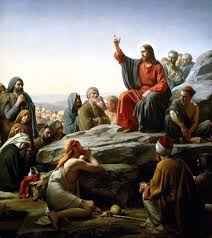
Seek Ye First The Kingdom of God And…
Yeshua instructed us to pursue those things that qualifies one to receive and enter the Kingdom of God and the righteousness of YHVH our Elohim. So how does Torah-keeping fit in with Yeshua’s instruction?

Torah Portions-The Many Types and Patterns of Torah
Returning from the Fall Feasts, we anxiously launch into a new season. Today we examine the two predominant-types of Torah Portions followed by Hebrew Rooters; I reflect upon our 2019 Sukkot experiences; and we examine some patterns and types found in Torah.
Preparing for the Feasts of God-2019–The Connection Between Grace and the Fall Feasts
As we approach the Fall Feasts of 2019, we are compelled to prepare spiritually and physically for each Feast’s arrival. In this discussion of the Fall Feasts, we discuss the connection between God’s grace and His Fall Feasts.
Paul’s Bold Stand Against Anti-Torah Teachings in the Ephesian Church—Part 15 of the Paul and Hebrew Roots Series
Why did Paul insert the creation story and the fall of man into 1 Timothy? Was it, as convention erroneously teaches, the reason women must not teach and preach in the Church? The answer to this question will shock you and cause you to appreciate battle Paul faced against Gnosticism in the Ephesian Assemblies of Messiah. This is Part 15 of our Paul and Hebrew Roots Series.
Paul Never Prohibited Women Teaching and Preaching in Church–Part-14 of the Paul and Hebrew Roots Series
The so-called Church over the centuries has used 1 Timothy 2:11&12 as the basis for their imposed prohibition against women teachers and preachers in the Body of Messiah. But we will show that his passage in no way prohibits women from fulfilling their call and giftings in the Body and Assemblies of Messiah.
First-Timothy—Paul’s Inconsistencies—Myths-Tales-Torah—Part-13 of the Paul and Hebrew Roots Series
In continuing our Paul and Hebrew Roots series, we look at seeming inconsistencies in Paul’s writings as well as examine the role myths and tales played in the teaching of Torah in the Ephesian Assemblies.
Modern Day Idolatry-God Approved Foods-Torah Keeping-Tithing–Reflections on Torah Portion Re’ eh
This week’s Torah Portion entitled ‘Re’eh’ is a rough sketch of the inner workings of the Kingdom of God: no idolatry-proper foods-the keeping of Torah-giving of Tithes–As we prepare to possess the Land of Promise.
Obedience to Torah-Marked for Destruction-The Wisdom of Wearing Phylacteries-Reflections on Torah Portion ‘Ekev
In this installment of TMTO, we reflect upon Torah Portion ‘Ekev–highlighting the importance of obedience to Torah–what nations were marked for destruction by YHVH and why–and the wisdom of wearing phylacteries by Torah observant believers in Yeshua Messiah.
1 Timothy-The Properly Attired Praying Woman-Part-12 of our Paul and Hebrew Roots Series
In this installment of our Paul and Hebrew Roots series, we consider Paul’s instructions regarding properly attired praying woman. We explore the significance of prayer in the early Church and the fact that Paul sought to use prayer as one of his first tactics against the scourge of early Gnosticism that had infiltrated the Ephesian assemblies of Messianic Believers. And we find clearly layed out in 1 Timothy that Paul advocated women leading worship and corporate prayer in the assemblies. Shalom and welcome.
First Timothy-Paul’s War Strategy Against Gnosticism-Part-11 of the Paul and Hebrew Roots Series
“As I counseled you when I was leaving Macedonia, stay on in Ephesus, so that you may order certain people who are teaching a different doctrine to stop. Have them stop devoting their attention to myths and never-ending genealogies; these divert people to speculating...
Let the Woman Learn in Silence-The Problem With First Timothy-Part 10 of the Paul and Hebrew Roots Series
1 Timothy 2:9-15 has been used by churchianity for years to prohibit women of Faith from doing what they were called to do. In this 10th installment of our Paul and Hebrew Roots series we dispel this false practice and understanding by examining the Truth of what Paul was truly saying in his letter to Timothy.
Phineas’ Covenant of Peace—Our Road Map to Peace in Messiah—Reflections on Torah Portion Pinchas
Peace is the birthright of every disciple of Y’shua Messiah. Yet so many of us lack true peace in our lives. What if I tell you that this week’s Torah Portion Pinchas provides a road map to peace in Messiah? Would you be interested? Come and let us reason together in the Word of our Elohim. Shalom and welcome.
Social Media and Hebrew Roots-A Warning to Discern Who’s Who in the Social Media Zoo
Most of us who are members of the True Faith Once Delivered, have one or more social media accounts. Many of us share our Faith convictions and or even minister on these platforms. But Social Media, like Hebrew Roots, can be likened to the Americana images of the...
A Little Balaam in Each of Us–Reflections on Torah Portion Balak
Can the character and principles of the prophet for profit Balaam be found in each of us. You may be surprised at what Scripture has to say about that. Welcome to The Messianic Torah observer and our reflections on Torah Portion Balak. Shalom and welcome.
Pray For The Peace of Jerusalem-Part 3 of the Love or Hate Israel Series
What does it mean to pray for the peace of Israel? We discuss also Israel in terms of her covenant-relation with God as well as her significance in end times prophecy.
Rebels in the Congregation-Reflections on Torah Portion Korah
As we examine Torah Portion Korah we learn about the potentially rebellious condition of our hearts; the importance of living holy lives; and the dangers of false teachers and their teachings to the Body of Messiah.
One Law For All–Reflections on Torah Portion Shelach Lekha
The Giver of Torah-YHVH-clearly stated that Torah was for all who would attach themselves to the commonwealth of Israel and live according to the Way He prescribed for men and women to live. Yet many within and without our Faith Community teach otherwise--that Torah...
Messianics—Modern Day Levites—Separated for Service to God—Thoughts and Reflections on Torah Portion Behaalosecha
This week’s Torah Portion-Behaalosecha-foreshadows a great many spiritual elements necessary for our service to the Kingdom of God. In a sense we are modern day Levites. We have been separated from all the nations people of the world unto God for His service. Are we up for the challenge? This is a wake-up call to the Body of Messiah to take immediate action.
Israel: To Love or Hate Her—That is the Question—Part 2–A Biblical and Personal Perspective on the Significance of Physical Israel
In this 2nd Part to our Israel: To Love or Hate Series, we continue our analysis of some the most common reasons people reject physical Israel today. As well as we consider some of the miracles said to have resulted in Israel’s deliverance from certain destruction. And lastly we consider the problems associated with the nation state of Israel. Shalom and welcome.
Burdens and Service-Thoughts and Reflections on Parashot Naso-Lift Up
Lessons of bearing burdens and service to YHVH are embodied in this week’s Torah Portion Naso. As disciples of Messiah, we are compelled to serve and bear burdens as we discuss in this post.
5-Facts About Pentecost [Shavuot] Every True Disciple of Messiah Should Know
As the Day of Pentecost (aka, Shavuot) descends upon many of us who are of Faith in the coming days, we reflectively prepare for the Day. With that preparing in mind, today I will reveal 5-things every spirit-filled disciple of Yeshua Messiah should know about Shavuot—Pentecost.
To Love Or Not Love Israel?That is the Question–Part 1
As Yeshua-focused Torah Keepers, how are we to view physical Israel? We discuss this polarizing issue from a historic, biblical and personal perspective. Shalom and welcome.
Shemittah and Jubilee-Shadows of the Rest, Redemption and Freedom We Have in Messiah
This week’s Torah Reading/Portion entitled B’Har is a message of the rest, redemption and freedom we have in Y’shua Messiah.
10-Things You Must Do To Improve Your Understanding of the Bible
In this installment of TMTO, I outline 10-things you can put into practice today that will drastically improve your understanding of the Bible.
Being Holy in the Midst of an Evil and Adulterous Generation
This week’s Torah Portion was timely indeed. As we are presently living in perilous times, this week’s Torah Portion challenges us to live holy lives in Messiah. We explore what it means and how to live holy lives.
Passover and the Feast of Unleavened Bread Replay
In light of this weekend’s Passover observance and our week’s longing keeping of the Feast of Unleavened Bread, I elected to repost a teaching I posted last year on Passover and the Feast of Unleavened Bread. Chag Pesach Sameach. Shalom.
Keeping God’s (Yehovah’s) Feasts
I give an overview of the Creator’s Feasts by discussing why we keep them; when we keep them and what they mean. Shalom and welcome.
M’tzora-Person Afflicted With Leprosy-Torah Portion 28-Commentary
Parashah 28-M'tzoro--Person Afflicted With Tzara'at Continuation This week's Torah Portion/Reading entitled "M'tzoro," or a "Person Afflicted with Tzara'at (Leprosy)" is somewhat of a continuation of last week's reading (ie., Tazaria) that dealt with the diagnosis and...
Tazria (She Conceives)-Leprosy, A Shadow of Sin and the Healing Work of Messiah–Parashah-27
In this week’s Torah Portion entitled Tazria, we consider the spiritual applications of leprosy.
How to Keep (Guard) the Month of the Aviv–Replay
In this replay of a past episode, we discuss how to keep–how to guard the Month of the Aviv. Happy New Year! Shalom.
Irresistible Holiness-Torah Portion-26-Eighth-Shi’mini–TMTO-23
What Father is essentially saying here to us through this shadow picture—this lesson—this Torah Portion—is, “Look, I’m going to get the glory and my holiness is going to be proclaimed and demonstrated to all the world. Now this can be done by and through your actions of obedience and worship of me. And if you choose to glorify me and extol the virtues of my holiness to the world, you’re going to have to do it my way. For if you don’t choose to do it my way, then I’m still going to get the glory and my holiness will be demonstrated and manifested through my chastising of you. You see, it’s going to be done my way; or it’s going to be done my way. Either way, I’m going to be glorified and deemed holy to all the world.”
Torah Portion 25–Give An Order–A Call To Worship
This week’s Torah Reading-Parashah-25–dealt with sacrifices and offerings. These were shadows of our worship of Father in Spirit and in Truth.
Let Your Women Keep Silence in the Church–Part-9 of the Paul and Hebrew Roots Series
We break down 1 Corinthians 14:34-35 to determine what Paul really meant when he instructed that the Corinthian women keep silence in the church.
Patterns of Evidence-The Moses Controversy Film Review
In this 21st installment of The Messianic Torah Observer, I review Tim Mahoney’s newest documentary, “Patterns of Evidence-The Moses Controversy.”
Thoughts and Reflections on Torah Reading Pedudei-Accounting Of
This week's Torah Reading entitled Pedudei (ie., Accounting Of) focused on worship. The reading consisted of Leviticus 1:1 to Lev. 5:6:7. The Haftorah consisted of Isaiah 43:21-44:23. Specifics of Worship That which was given to us by Abba related to worship...
TMTO-20-Endure Sound Doctrine I Will Not
Many members of the Body of Messiah will not endure sound doctrine as they are being led astray by false teachers or they themselves are teaching false doctrine. We discuss this troubling situation and provide ways to overcome the deception.
The Un-Silenced Women of Paul’s Ministry-Part 8 of the Paul and Hebrew Roots Series
Many female leaders were associated with the Apostle Paul’s ministry. We highlight some of those great first-century women of the Body of Messiah.
When Evil is Considered Good–The Hypocritical, Evil and Demented Mindset of America Today
What are the challenges facing today’s Torah Observant Disciple of Yahoshua in America Today?
The Unsilenced Women of the Bible-From Torah to the Conversion of Paul-Part 7 of the Paul and Hebrew Roots Series
The Pauline Passages of Question So as to re-establish or restate the issue at hand as it relates to Paul’s views about women in the Body and Assemblies of Messiah, the primary passage in question is as follows: “Let your women keep silence in the...
Parashat Mishpatim Judgment-Property and Love of Neighbor
This Week's Torah Reading In continuing my travels through this week's Torah Reading, I came upon Exo. 21:28-36. I found endless truths and spiritual applications that I am so happy to share with you today. The Consequences of Negligence This passage in a narrow sense...
Parashat Mishpatim Judgment-Murder-Abortions-Sanctuary
Timeliness of This Week's Torah Reading This week’s Torah Reading could not have been more timely. And I was compelled to respond in the wake of the news we’ve received over the last couple weeks regarding the legalization of late term abortions on demand. And just...
Parashat Mishpatim or Judgments-Debt and Slavery
Concerning the Treatment of Slaves by Hebrews The first portion of this week's Torah Reading deals with the issue of Hebrews owning slaves; particularly Hebrew slaves (Exo. 21:1-11) . According to this passage, if a Hebrew acquires a Hebrew slave, they would serve...

0 Comments